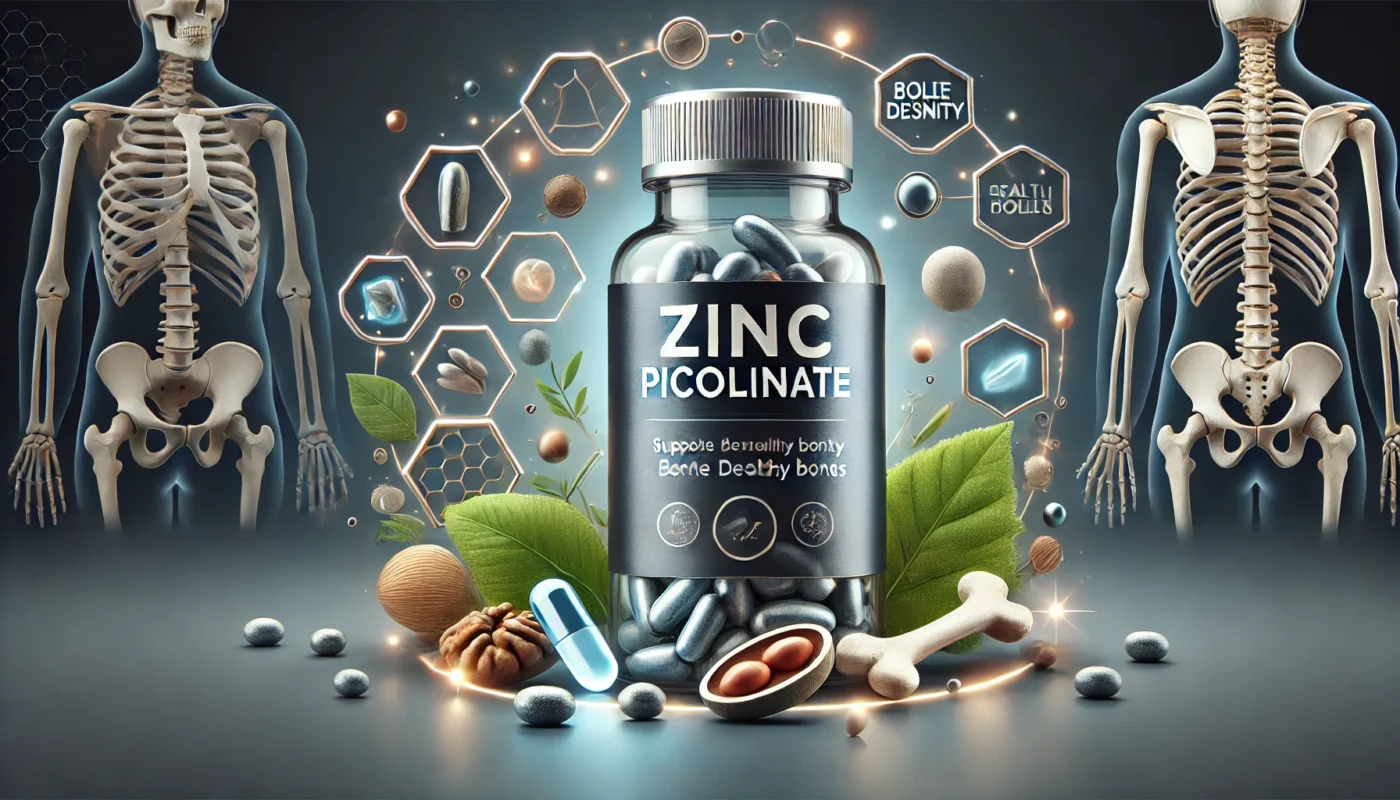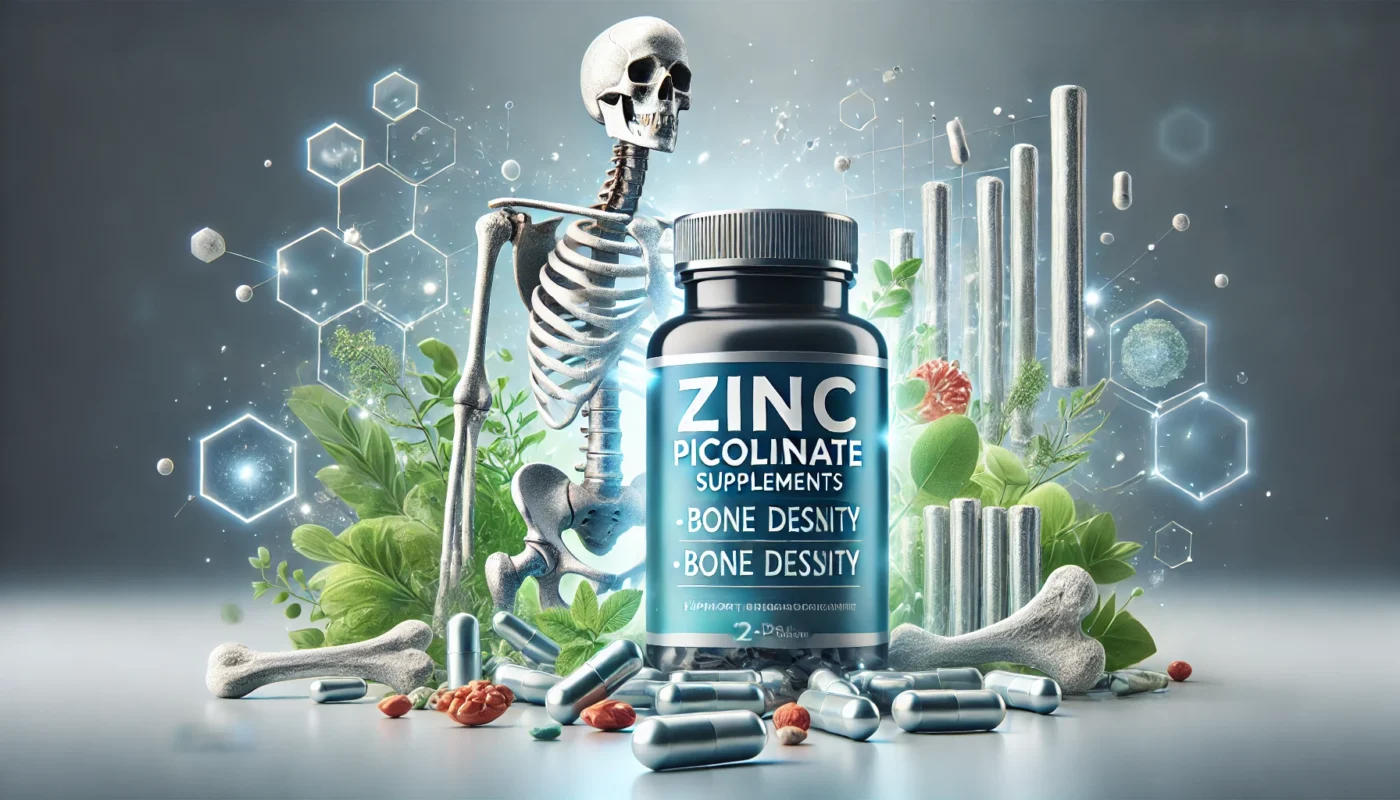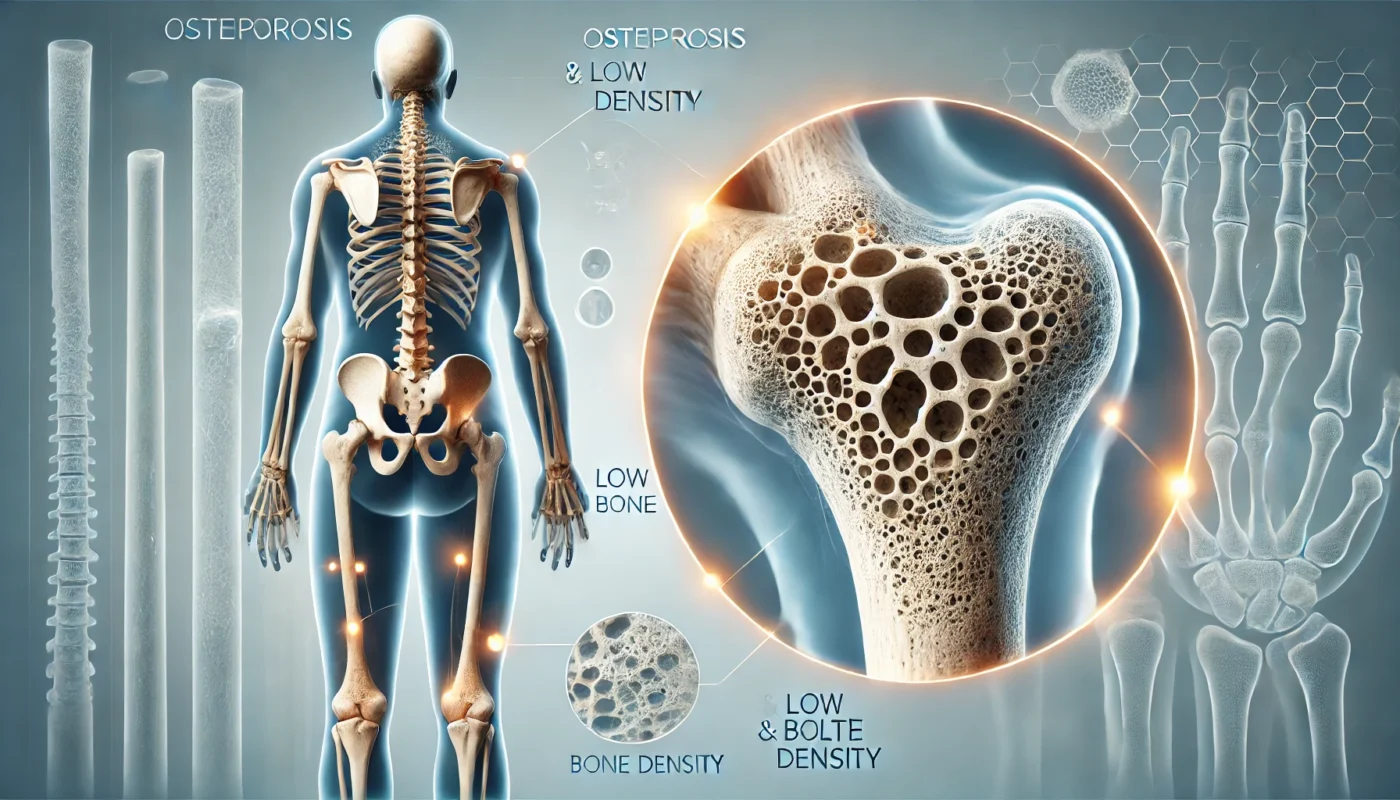Osteoporosis, characterized by weakened bones and an increased risk of fractures, is a significant global health concern, particularly among aging populations. According to the International Osteoporosis Foundation, over 200 million people worldwide suffer from osteoporosis, with one in three women and one in five men over the age of 50 experiencing an osteoporotic fracture. While calcium and vitamin D are often highlighted in discussions about bone health, zinc is an equally vital, yet frequently overlooked, nutrient.
Zinc plays a crucial role in bone metabolism, supporting the processes that build and maintain bone mineral density. Zinc picolinate, a highly bioavailable form of zinc, offers a natural and effective way to strengthen bones and reduce the risk of osteoporosis. This article delves into the science behind zinc picolinate’s role in bone health, supported by clinical studies and actionable insights for osteoporosis prevention.
You May Also Like:
Zinc Picolinate for Accelerating Bone Fracture Healing: Can It Help?
The Role of Zinc Picolinate in Bone Density Testing: What Research Says
Zinc Picolinate for Osteoporosis Prevention: Strengthening Bones Naturally is an original (HSLHealing) article.
Understanding Osteoporosis: A Silent Condition
Osteoporosis develops when the body loses too much bone mass, makes too little new bone, or both. The condition often progresses silently, without symptoms, until a fracture occurs. Common sites of fractures include the hips, wrists, and spine.
Key Risk Factors for Osteoporosis:
- Aging:
Bone mass naturally declines with age, particularly after menopause in women due to hormonal changes. - Nutritional Deficiencies:
Inadequate intake of calcium, vitamin D, and zinc impairs bone formation and maintenance. - Sedentary Lifestyle:
Lack of weight-bearing exercises weakens bones over time. - Medical Conditions and Medications:
Conditions like rheumatoid arthritis or medications such as corticosteroids increase bone loss.
The Role of Zinc in Bone Health
Zinc is essential for maintaining healthy bones and preventing osteoporosis. Its specific roles include:
- Stimulating Bone Formation:
Zinc promotes the activity of osteoblasts, the cells responsible for forming new bone tissue. - Inhibiting Bone Resorption:
Zinc reduces the activity of osteoclasts, the cells that break down bone tissue, thereby preserving bone density. - Supporting Collagen Synthesis:
Collagen forms the framework of bone tissue, and zinc is critical for the enzymes involved in collagen production. - Enhancing Calcium Absorption:
Zinc facilitates the absorption and utilization of calcium, a key mineral in bone formation. - Acting as an Antioxidant:
Zinc neutralizes free radicals, reducing oxidative stress that can weaken bones.

What Is Zinc Picolinate?
Zinc picolinate is a chelated form of zinc, where zinc is bound to picolinic acid. This form improves zinc absorption in the gastrointestinal tract, making it one of the most effective supplements for addressing zinc deficiencies. For individuals at risk of osteoporosis, zinc picolinate provides a bioavailable solution to support bone health.
How Zinc Picolinate Supports Bone Health
1. Increasing Bone Mineral Density (BMD)
Bone mineral density is a key indicator of bone strength. Zinc picolinate enhances BMD by stimulating osteoblast activity and reducing osteoclast-induced bone resorption.
- Study Insight: A study in Biological Trace Element Research found that zinc supplementation increased bone mineral density by 15% in postmenopausal women with low zinc levels, significantly reducing their risk of fractures.
2. Supporting Collagen Production
Collagen is the protein matrix that provides bones with flexibility and tensile strength. Zinc picolinate supports the enzymes involved in collagen synthesis, ensuring a strong foundation for bone mineralization.
- Clinical Evidence: Research in Journal of Bone and Mineral Research reported that zinc deficiency impaired collagen production, leading to brittle and fragile bones, while supplementation restored collagen levels and improved bone integrity.
3. Enhancing Calcium Metabolism
Calcium is critical for bone health, but its absorption and utilization depend on adequate zinc levels. Zinc picolinate ensures that dietary calcium is effectively used for bone formation.
- Research Finding: A study in Nutrients showed that zinc supplementation improved calcium absorption by 20%, enhancing bone strength in individuals with zinc deficiency.
4. Reducing Oxidative Stress in Bones
Oxidative stress accelerates bone loss by damaging osteoblasts and promoting osteoclast activity. Zinc picolinate’s antioxidant properties protect bone cells from oxidative damage.
- Evidence: A study in Free Radical Biology and Medicine demonstrated that zinc reduced markers of oxidative stress by 25%, preserving bone cell function in aging populations.
5. Regulating Hormones for Bone Health
Zinc influences hormones like parathyroid hormone (PTH) and insulin-like growth factor-1 (IGF-1), which are critical for bone metabolism.
- Study Insight: Research in Endocrinology found that zinc supplementation increased IGF-1 levels by 18%, promoting bone formation and reducing bone loss in older adults.

Zinc Deficiency and Osteoporosis Risk
Zinc deficiency is a common but underdiagnosed issue, particularly among older adults. Without sufficient zinc, the body cannot maintain optimal bone formation and repair.
Symptoms of Zinc Deficiency Include:
- Frequent Fractures:
Weak bones that break easily, even with minor falls or injuries. - Delayed Wound Healing:
Slower recovery from fractures or surgeries. - Chronic Inflammation:
Increased inflammatory markers that accelerate bone resorption.
Statistics:
- A study in The American Journal of Clinical Nutrition found that 30% of older adults had zinc intakes below recommended levels, correlating with lower bone mineral density and higher fracture rates.
Dietary Sources of Zinc
While supplementation is often necessary for addressing deficiencies, incorporating zinc-rich foods into the diet can support bone health. Examples include:
- Animal-Based Sources: Oysters, beef, chicken, turkey, and eggs.
- Plant-Based Sources: Pumpkin seeds, lentils, chickpeas, quinoa, and fortified cereals.
For individuals with limited dietary zinc intake, zinc picolinate provides a reliable and bioavailable alternative.

Recommended Dosage and Safety
The recommended dietary allowance (RDA) for zinc is:
- Men: 11 mg/day
- Women: 8 mg/day
For preventing osteoporosis, therapeutic doses of zinc picolinate typically range from 15–30 mg/day. Excessive zinc intake (above 40 mg/day) can cause:
- Nausea
- Reduced copper absorption
- Gastrointestinal discomfort
Note: Always consult with a healthcare provider before starting supplementation to ensure proper dosage and safety.
Integrating Zinc Picolinate into a Bone Health Routine
- Take with Meals: Zinc picolinate is best absorbed when taken with food, particularly meals containing protein.
- Combine with Calcium and Vitamin D: These nutrients work synergistically with zinc to enhance bone strength.
- Incorporate Weight-Bearing Exercises: Activities like walking, jogging, or resistance training improve bone density.
- Monitor Bone Health: Regular bone density scans can track the effectiveness of supplementation.
Who Can Benefit from Zinc Picolinate for Bone Health?
- Postmenopausal Women: Zinc picolinate reduces bone loss caused by hormonal changes.
- Older Adults: Zinc supports bone density and reduces fracture risk in aging populations.
- Individuals with Osteopenia: Zinc picolinate strengthens bones before osteoporosis develops.
- Vegetarians and Vegans: Zinc supplementation ensures adequate intake for those with plant-based diets.
Future Research Directions
While current studies highlight the benefits of zinc picolinate for bone health, further research could explore:
- Long-term effects of zinc supplementation on osteoporosis prevention.
- Synergistic benefits with other bone-supporting nutrients like magnesium and collagen peptides.
- Zinc’s role in improving fracture healing times and outcomes.
Conclusion: Zinc Picolinate for Stronger Bones and Osteoporosis Prevention
Zinc picolinate offers a powerful, science-backed solution for maintaining bone health and preventing osteoporosis. By enhancing bone mineral density, supporting collagen production, and reducing oxidative stress, zinc picolinate addresses the root causes of bone loss and fragility.
For individuals seeking to protect their bone health and reduce the risk of fractures, incorporating zinc picolinate into their routine provides significant benefits. As always, consult with a healthcare provider to tailor supplementation to your specific needs and ensure safe and effective use.

References
- Haase, H., & Rink, L. (2014). The Role of Zinc in Bone Tissue Health and Regeneration-a Review. Retrieved from: https://pubmed.ncbi.nlm.nih.gov/37002364/
- Prasad, A. S. (2013). Zinc supplementation improves bone density in patients with thalassemia: a double-blind, randomized, placebo-controlled trial, Retrieved from: https://pmc.ncbi.nlm.nih.gov/articles/PMC3778866/
- Kilic, M., et al. (2016). Zinc status is independently related to the bone mineral density, fracture risk assessment tool result, and bone fracture history: Results from a U.S. nationally representative survey Journal of Bone and Mineral Research. Retrieved from: https://www.sciencedirect.com/science/article/pii/S0946672X21000559
- Lukaski, H. C. (2018). The Role of Zinc in Bone Tissue Health and Regeneration—a Review. Retrieved from:. https://link.springer.com/article/10.1007/s12011-023-03631-1
- Zinc enhances the cellular energy supply to improve cell motility and restore impaired energetic metabolism in a toxic environment induced by OTA. Retrieved from: https://pmc.ncbi.nlm.nih.gov/articles/PMC5676743/
Important Note: The information contained in this article is for general informational purposes only, and should not be construed as health or medical advice, nor is it intended to diagnose, prevent, treat, or cure any disease or health condition. Before embarking on any diet, fitness regimen, or program of nutritional supplementation, it is advisable to consult your healthcare professional in order to determine its safety and probable efficacy in terms of your individual state of health.
Regarding Nutritional Supplements Or Other Non-Prescription Health Products: If any nutritional supplements or other non-prescription health products are mentioned in the foregoing article, any claims or statements made about them have not been evaluated by the U.S. Food and Drug Administration, and such nutritional supplements or other health products are not intended to diagnose, treat, cure, or prevent any disease.

